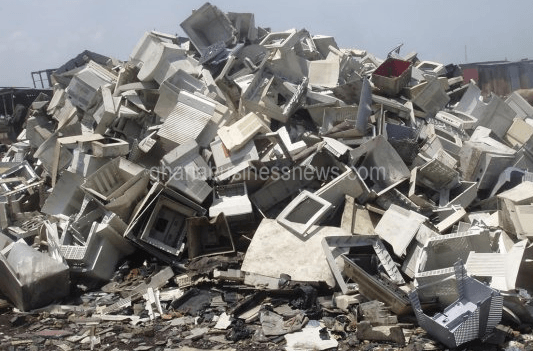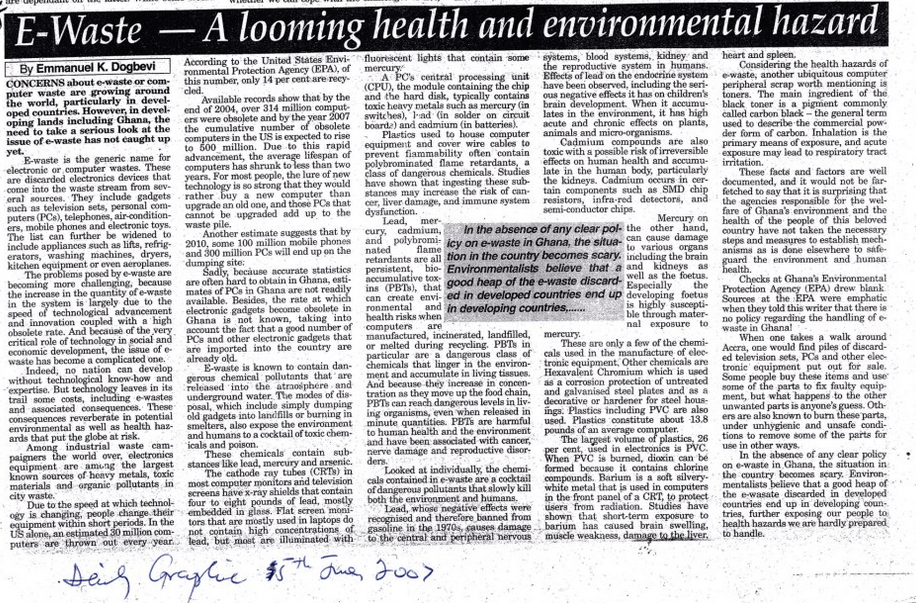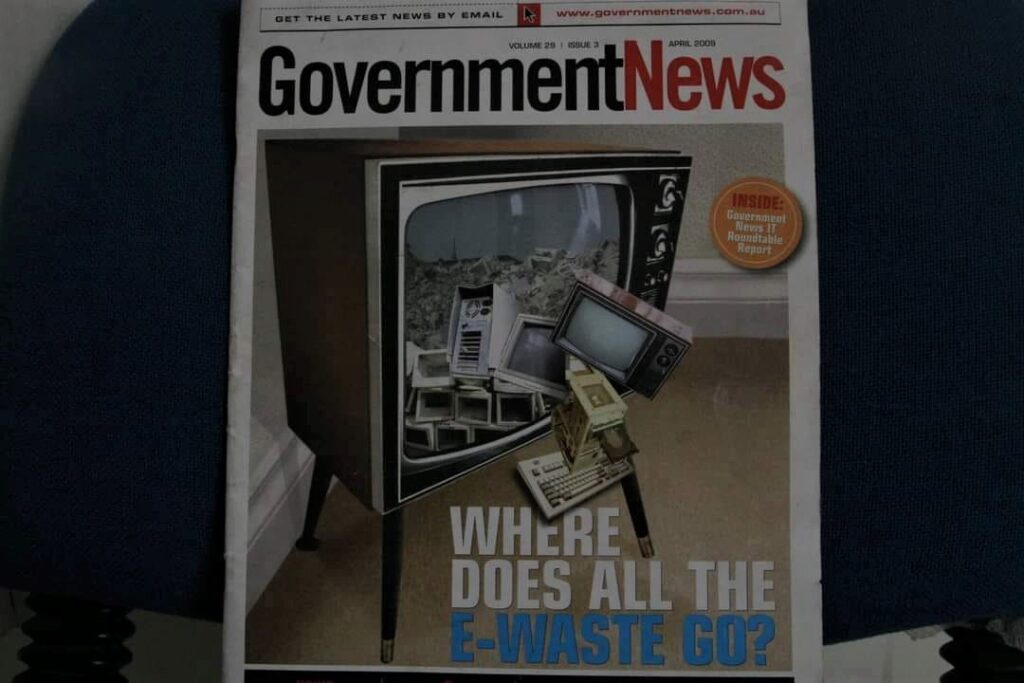One journalist, his works on e-waste dumping in Ghana and a country that looks the other way

Ghana has had a democratic system of governance since the 1992 Constitution came into force. The Constitution dedicates a chapter, Chapter 12 to press freedom and the role of journalists in holding power to account.
A free press is without doubt fulcrum for progressive democratic processes that also enhance personal freedoms and dignity – it is therefore imperative, that journalists do their work with dedication, a commitment to the truth and responsibility to the tenets of journalism such as being factual, balanced, truthful to the facts, ethical and without fear or favour and in a free and safe environment. And most Ghanaian journalists throughout history have played and continue to play their parts, often under trying and difficult circumstances.
In this long history of the noteworthy contributions of Ghanaian journalists, is embedded the story of one journalist, who, even though hardly recognisable, either by fate or design, has made and continues to contribute to the impactful works of the country’s often overlooked hardworking journalists who spend time on the field digging out and telling important stories.

This journalist’s work would remain indelible when the story of journalists in Ghana is fully and truly told.
In June 2007, a story appeared in the Daily Graphic newspaper. It was June 5. The story was titled ‘E-waste – a looming health and environmental hazard.’ The story, an explainer, is also the very first time any story on the problem of e-waste dumping was appearing in the Ghanaian media. The problem was unknown before that story. Not many Ghanaians have ever heard about e-waste. While the story didn’t catch the attention of many Ghanaians, it spooked people elsewhere who knew what threats – environmental and health wise that uncontrolled dumping of e-waste could pose.
E-waste is the generic name for electronic or computer wastes, such as discarded electronics devices that come into the waste stream from several sources. They include gadgets like televisions, personal computers (PCs), telephones, air conditioners, cell phones, and electronic toys. The list can further be widened to include appliances such as lifts, refrigerators, washing machines, dryers, kitchen equipment or even aeroplanes.
E-waste is known to contain dangerous chemical pollutants that are released into the atmosphere and underground water.
The modes of disposal, which include dumping old gadgets into landfills or burning in smelters, also expose the environment and humans to a cocktail of toxic chemicals and poison.
These chemicals contain substances like lead, mercury and arsenic.
The cathode ray tubes (CRTs) in most computer monitors and television screens have x-ray shields that contain 4 to 8 pounds of lead, mostly embedded in glass.
As an individual journalist, I have written about e-waste dumping in Ghana more than all the media houses in the country put together.
Flat screen monitors that are mostly used in laptops do not contain high concentrations of lead, but most are illuminated with fluorescent lights that contain some mercury.
A PC’s central processing unit (CPU), the module containing the chip and the hard disk, typically contains toxic heavy metals such as mercury (in switches), lead (in solder on circuit boards), and cadmium (in batteries).
Plastics used to house computer equipment and cover wire cables to prevent flammability often contain polybrominated flame retardants, a class of dangerous chemicals. Studies have shown that ingesting these substances may increase the risk of cancer, liver damage, and immune system dysfunction.
Lead, mercury, cadmium, and polybrominated flame retardants are all persistent, bio-accumulative toxins (PBTs), that can create environmental and health risks when computers are manufactured, incinerated, landfilled or melted during recycling. PBTs, in particular are a dangerous class of chemicals that linger in the environment and accumulate in living tissues.
And because they increase in concentration as they move up the food chain, PBTs can reach dangerous levels in living organisms, even when released in minute quantities. PBTs are harmful to human health and the environment and have been associated with cancer, nerve damage and reproductive disorders.
Looked at individually, the chemicals contained in e-waste are a cocktail of dangerous pollutants that kill both the environment and humans slowly.
Lead, which negative effects were recognized and therefore banned from gasoline in the 1970s causes damage to the central and peripheral nervous systems, blood systems, kidney and the reproductive system in humans.
Effects of lead on the endocrine system have been observed, including the serious negative effects it has on children’s brain development. When it accumulates in the environment, it has high acute and chronic effects on plants, animals and micro-organisms.
Cadmium compounds are also toxic with a possible risk of irreversible effects on human health and accumulate in the human body, particularly the kidneys. Cadmium occurs in certain components such as SMD chip resistors, infra-red detectors, and semi-conductor chips.
Mercury on the other hand, can cause damage to various organs including the brain and kidneys as well as the fetus. More especially, the developing fetus is highly susceptible through maternal exposure to mercury.
These are only few of the chemicals used in the manufacture of electronics equipment. Other chemicals are Hexavalent Chromium which is used as a corrosion protection of untreated and galvanized steel plates and as a decorative or hardener for steel housings. Plastics including, PVC are also used. Plastics constitute about 13.8 pounds of an average computer.
The largest volume of plastics, 26 per cent used in electronics is PVC. When PVC is burned, dioxin can be formed because it contains chlorine compounds. Barium, is a soft silvery-white metal that is used in computers in the front panel of a CRT, to protect users from radiation.
Studies have shown that short-term exposure to barium has caused brain swelling, muscle weakness, damage to the liver, heart and spleen.
Considering the health hazards of e-waste, another ubiquitous computer peripheral scrap worth mentioning is toners. The main ingredient of the black toner is a pigment commonly called, carbon black – the general term used to describe the commercial powder form of carbon.
Inhalation is the primary means of exposure, and acute exposure may lead to respiratory tract irritation.
I was put on the communication committee. My name and details were written down. Then we left. I was never invited to any meeting. The outcome of that meeting was a scientifically done report on e-waste in Ghana. I somehow found the report and did a story on it.
As an individual journalist, I have written about e-waste dumping in Ghana more than all the media houses in the country put together. As a matter of fact, it took several years after I broke the story on the problem before Ghanaian media organisations started paying attention to the matter. Indeed, the first foreign media to report on the issue was the US broadcaster, PBS, and that was soon after an expanded online version of the story I published in the Daily Graphic was published on myjoyonline.com sometime in August 2007 under the title ‘E-waste is killing Ghanaians slowly’.

I didn’t stop writing about e-waste in Ghana after the first story. I have continued to write, and I did photo stories, videos, radio reports and interviews. I was commissioned to do a story on the subject for the ‘Government News’ of Australia, sometime in 2009, and the story was published on the front cover. I was subsequently contacted by a producer for National Geographic to whom I licensed one of my photos on e-waste that was used in a documentary.

The online version of the story was also published as a chapter in a textbook titled, Cross Currents: Cultures, Communities, Technologies by Cengage Learning, a publishing house based in New York City in 2013.
I have written more than 60 times on the subject. Many NGOs sprang up to work on the matter. Innovations have been made and a law to manage the problem was eventually passed in 2016.
The German government also provided a grant of €25 million to build a recycling plant.
A lot has happened in efforts to manage the e-waste menace. But I was never invited to any conversation or event in Ghana to discuss the subject. Until sometime in November 2011 when a Swiss organisation was funding a stakeholder meeting on e-waste in Ghana. The organisation in Switzerland asked the EPA in Ghana to invite me to the meeting – but they said they didn’t know where to find me. Eventually, a senior official of the EPA managed to get my number and called me. He told me he had gone all over the place looking for me, because he didn’t know where to find me. I was eventually invited to the meeting. After the meeting, committees were formed to work on a study on e-waste in the country. I was put on the communication committee. My name and details were written down. Then we left. I was never invited to any meeting. The outcome of that meeting was a scientifically done report on e-waste in Ghana. I somehow found the report and did a story on it.
My attention has also been drawn by others to my works on e-waste being cited in documentaries by TV and radio stations in Ghana, and they never credit me. I was once in Addis Ababa when a mate I studied with at the University of Ghana, sent me a message that he was watching a documentary on a TV station in Ghana, and he could tell that a large part of the script was coming from my works – for someone who has read most of my works on e-waste, he became very familiar with the content.
Journalism is often a thankless job, and journalists are often not likely to tell their own stories. But we make enormous contributions to the country and larger society. However, the nature of our work, which is often publishing what people don’t want published makes people not informed about the importance of journalism to see us as enemies and against their wellbeing.
My good friend Moussa Aksar, the Nigerien investigative journalist, says as journalists, “we are the enemies of our leaders”. This enmity seems to have enveloped the sense of what we do, making it often difficult for our contributions to be duly appreciated. Some find us annoying, and troublesome. Some see us as troublemakers. But we do important work that saves lives, saves the country money and propel and project our country. And while we speak for the voiceless, we are often left with no one to speak for us, because again, most journalists have the unfortunate notion that, journalists must not write about themselves.
However, as it is said in Ghana, ‘when a person does good, they deserve to be honoured’.
If the e-waste problem in Ghana today has come to attention, and a law has been passed, innovations on managing the waste have been introduced and a National E-waste Fund has been established, it must be known that my works have largely led to that – and I am gratified, because that leaves me fulfilled as a citizen, and as a journalist.
By Emmanuel K Dogbevi
Email: edogbevi@gmail.com
Copyright ©2023 by NewsBridge Africa.
All rights reserved. This news item or any portion thereof may not be reproduced or used in any manner whatsoever without the express written permission of the publisher except for the use of brief quotations in reviews.

Exceptionally espoused. Brilliantly documented. Courageously revealed! Undoubtedly impactful!
May this write up vindicate you and others in this same light.
Whether or not you’re awarded or rewarded for this groundbreaking article or not, remember you have served Mother Ghana well. The intervention although not swiftly has had the potential to inspire caution and policies in countries beyond Ghana.
Although today you seem to have been “unintentionally “ overlooked, mark it on the walls- the true sons and daughters of Ghana in this generations and those yet to come will seek you out and pay you what’s due you.
You deserve it!
We ask for good health for you.
Be resolute and keep on keeping on.
Your labour for God & Country shall not be in vain.
God bless you & God bless our homeland-Ghana.
Cheers to greater works.
EmMA.